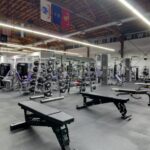With summer winding down here in Denver, now is a great time to focus on improving your health before the busy fall and holiday season arrives. The month of September is the perfect time to start implementing healthier lifestyle habits that will benefit you both now and later in the year.
To get you started, we have five tips to improve your nutrition, fitness, and overall health by the end of the year. Some of these tips might seem like no-brainers, but we have listed out some amazing benefits of each habit that will help motivate you if you’ve been slacking in any of these categories. Implementing just a few of these suggestions can lead to real results over the next several months. So, let’s go!
1. Start strength training
Weightlifting is not just for bodybuilders! There are so many reasons you should incorporate strength training into your weekly exercise routine. Lifting weights stimulates muscle growth by causing small tears in the muscle fibers, which are then repaired during rest to become stronger. This leads to increased muscle strength and definition, helping you to reshape your body. It’s key to improving your health by building lean muscle mass, and helps maintain and build bone density reducing the risk of osteoporosis. Weight lifting improves balance and stability, reducing the risk of falls and injury, which is important as we age.
Strength training builds lean muscle mass, which boosts your metabolic rate, and supports fat loss, especially when it comes to visceral fat – the abdominal fat that is stored deep in your belly around your organs. Weight training also improves your heart health by decreasing blood pressure and lowering bad LDL cholesterol. We could go on and on. If you have been putting weight training on the back burner, this is your sign to pick up some weights and start training! To get started, try to do 2-3 weight lifting sessions per week, targeting all major muscle groups.
If you are not sure where to start and need some guidance, consider hiring one of the RMFlex personal trainers. With their help, you can start implementing a new weight training routine that will help you get closer to your goals and improve your long-term health!
2. Implement Zone 2 Training
Zone 2 cardiovascular training provides many health benefits, such as improving recovery, weight management by using fat and oxygen as an energy source, improving insulin sensitivity, building your aerobic base, and reducing your risk for injuries and overtraining.
Zone 2 training can provide many benefits for both endurance and strength training. Zone 2 exercise performed at a relatively low intensity allows you to build aerobic capacity and delay the onset of fatigue by improving your body’s ability to utilize fuel and clear waste products. Over time, training in Zone 2 enhances mitochondrial function, increases capillary density, and improves blood flow. This leads to faster recovery between intense efforts, allowing you to perform more high-quality sets with heavier weights when strength training.
To effectively train in Zone 2, aim for 3-4 one-hour cardio sessions per week at around 60-70% of max heart rate. You should maintain a conversation at this pace. To determine your max heart rate, subtract your age from 220 bpm, then multiply that by 60-70%. Additionally, you can use a wearable that monitors heart rate, such as a Whoop, Garmin, Polar, Fitbit, or Apple Watch, or do a VO2 Max test in your local area.
Activities like running, jogging, cycling, rowing, and walking a treadmill on an incline can help you better control your heart rate in the optimal heart rate zone. So, jump on one of the Woodway treadmills at Rocky Mountain Flex Fitness and get started with Zone 2 training!
3. Eat more protein
To gain and maintain muscle from strength training, make sure you get enough protein in your diet, aiming for 0.73–1.10 grams of protein per pound of body weight daily. Great protein sources include organic lean meats like chicken, beef, fish, whole eggs, egg whites, whey protein, collagen, dairy, pea protein, and more.
Protein is an essential nutrient that is made up of 20 building blocks known as amino acids. 9 of the 20 are essential amino acids meaning the body cannot make them on its own and we must get them from quality protein sources in our diet. The other 11 amino acids can be created by the body, making them non-essential amino acids.
Protein is vital to your health, it’s called the building block of life and for good reason…you literally can’t survive without it. Protein is in every cell of your body, and it’s critical that you have enough each day for your body to build and repair cells. Protein is also an important component of your bones, muscles, tendons, cartilage, skin, blood and more.
Eating a high-protein diet is important overall, but especially as you age because you now have a much higher protein requirement to maintain muscle mass – mainly because your system is no longer dominated by hormones like when you were in your 20s. The goal as you age is to maximize muscle protein synthesis so that you can preserve lean tissue – over time, it will help with strength, bone health, and other essential functions that keep you mobile and balanced.
Eating high-protein foods requires preparation, and this is where weekly meal prep comes into play. When you prep your meals ahead of time or use a meal prep service, you are in complete control of the foods that go into your body. You have the power to eat in a way that makes you feel energized and healthy and helps you build strong muscles that will shape your physique.
4. Stay hydrated
Staying properly hydrated is crucial for overall health and well-being. So if you’re someone who “hates water”, it’s time to start loving it! Water supports practically every function in the human body. It transports nutrients and oxygen to cells, supports digestion, removes waste, lubricates joints, protects sensitive tissues, and regulates body temperature. Water even plays a role in cognitive functions like concentration and memory.
Aim to drink half your body weight in ounces of water. So, say you weigh 150lbs, then you should drink about 75oz of water throughout the day. For added taste, add lemon, basil, mint, or cucumber for flavor.
Another way to help boost your hydration and key minerals is to add electrolytes to your water. Electrolytes like sodium, potassium, calcium, phosphorus, chloride, and Magnesium play vital roles in your body. They help regulate muscle and nerve function, hydration levels, blood pressure, prevent dehydration, and muscle fatigue.
Daily electrolyte intake aids recovery by replenishing minerals lost in sweat during a hard workout. For both athletes and non-athletes, electrolyte drinks can provide key minerals the body needs for optimal function, and they can add a delicious flavor to your water!
5. Prioritize sleep
Getting 7-9 hours of quality sleep per night will leave you feeling energized while supporting concentration, cognitive function, metabolic health, mood, and immune health. When you don’t get enough sleep, you can also raise your cortisol levels and increase your risk of visceral fat. Develop an evening routine that helps you wind down and relax before bedtime. It is helpful to get consistent, by trying to go to bed at the same time every night. Things that can negatively affect your sleep leading up to your bedtime are blue light exposure from devices, drinking alcohol, consuming caffeine too late in the day, and eating a large meal.
If you have trouble falling or staying asleep at night, you may need to reset your circadian rhythm, which is a 24 hour internal clock that regulates the cycles your body goes through, specifically when you fall asleep and wake up.
Things that may improve your sleep are sleeping in a dark room or wearing an eye mask, avoiding screens before bed but if that is not possible, wear blue light blocking glasses, staying hydrated throughout the day, eating dinner a few hours before bedtime, and taking 300-400mg of magnesium nightly.
Making these healthy lifestyle changes now will pay off over time. Just focus on one or two tips each week until they become habits. Your future self will thank you!
If you live in Denver and are looking for a gym with a great community of people who are passionate about their health, then look no further than Rocky Mountain Flex! Sign up for our 7-Day trial pass to come check out our gym in Denver’s Baker area.














